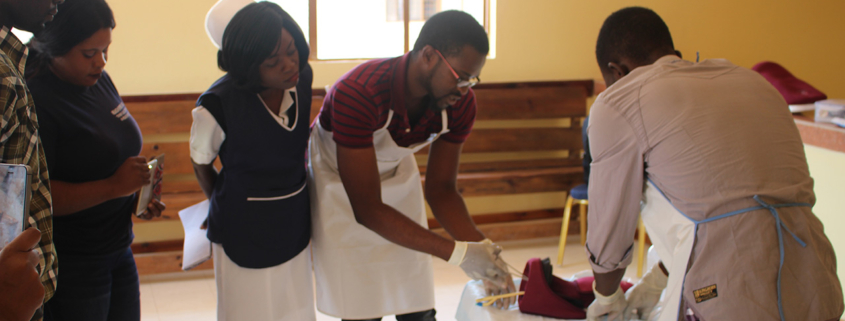Harnessing Behavioral Design to Improve Maternal Care in Zambia
Written by: Jill Chanley, Jana Smith, and Rachel Yavinsky, Breakthrough RESEARCH
Recently, Breakthrough RESEARCH, under work led by ideas42, applied behavioral design to assess the behavioral challenges that prevent providers in Zambia from providing respectful maternal care (RMC) in urban and rural health care settings. Behavioral design is an approach that leverages insights from behavioral economics, social psychology, human-centered design, and other disciplines to develop and test innovative solutions that reshape people’s environment to facilitate positive behavior change. The study identified behavioral barriers to RMC and led to the development of low-cost, feasible solutions with clients and providers. You can read our programmatic research brief to learn more about the research process and solutions.

Ameck Kamanga has been speaking about the importance of respectful maternal care
Ameck Kamanga, Technical Services Director of the Safe Motherhood 360+ (SM360+) project at JHPIEGO and an advocate of RMC in Zambia, shared in an interview that he wasn’t particularly surprised by the study’s findings. He explained that, while there is an awareness of RMC in Zambia, most health facilities and projects such as SM360+ focus more on clinical outcomes than patient experience. In fact, even members of his team initially argued that RMC was outside the scope of the project.
But Kamanga has seen the effects of the RMC solutions in action. His team in Chipata District is working closely with providers to implement the ideas generated during the co-creation process and has seen a willingness from many of the providers to try them. He was pleasantly surprised at the success of the client feedback boxes during user testing in obtaining comments about women’s experiences at facilities, given that previous attempts at other facilities have been ineffective. Some providers have expressed misgivings about the potential increased workload resulting from implementing the new solutions, but Kamanga emphasized that, as RMC is a part of providing quality overall care, providers’ actions should complement existing work without increasing their current level of effort.
Kamanga has used every opportunity to share the research findings and raise the profile of RMC in Zambia. Platforms such as the Safe Motherhood and Quality Assurance Technical Working Groups have been great ways to ensure that RMC is incorporated by diverse partners working in maternal and newborn care. At a national level, the findings have sparked interest from the directorate responsible for quality assurance. SM360+ has also begun working with district leadership to integrate aspects of RMC into their technical supervisory visits to facilities. In an exciting development, the Midwives Association has received funding to develop RMC national guidelines — a gap identified by the research findings — and Kamanga shared those findings, and related solutions, with the group during their initial brainstorming sessions.
Kamanga is optimistic about the future of RMC in Zambia. And after seeing the application of behavioral design firsthand, he now understands the value of using this approach to solve other pressing issues in health care.


 Sara Holbak/VectorWorks/Photoshare
Sara Holbak/VectorWorks/Photoshare
 2019 CORE Group Global Health Practitioner Conference
2019 CORE Group Global Health Practitioner Conference WHO
WHO Breakthrough ACTION
Breakthrough ACTION Photo credit: amy Rakotoniaina/PMI/Flickr
Photo credit: amy Rakotoniaina/PMI/Flickr